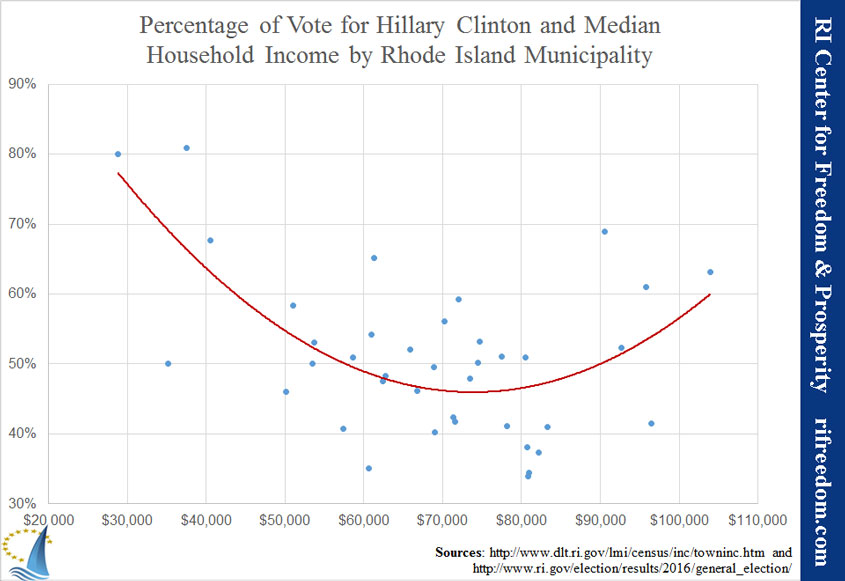The Story of Rhode Island in the Trump-Clinton Divide
The other day, the Providence Journal published an interesting map showing that, much like the country as a whole, Rhode Island’s presidential votes were split by region, with the coastal municipalities’ going to Hillary Clinton and the interior going to Donald Trump. The image oversimplifies, of course; several cities and towns in the northeast of the state don’t touch the coast, and Charlestown and Tiverton went to Clinton without her winning even half of the vote.
Reporter Paul Edward Parker touch on some of the nuance in the numbers:
Four of the five communities with the highest median household incomes voted for Clinton, as did seven of the eight communities with the lowest incomes.
Essentially, Clinton drew her support from the wealthiest and poorest places, while Trump drew his from the middle.
Laying this out in more detail arguably tells the story of Rhode Island’s current condition in a single chart:
In that red U, we see both the story of the “productive class” and the workings of the “company state.”
Refer back to this 2009 post on Anchor Rising, and you’ll see that the bottom of the U is almost exactly in line with the population that has been leaving Rhode Island throughout this millennium. As those Rhode Islanders flee the state, those who remain are increasingly part of the “company state” or “government plantations” model, wherein highly paid service providers in and around government have incentive to increase the number of clients requiring subsidized services as a pretense for taking money away from those above the line for subsidies.
This model harms the economy and drives people away because it reduces the incentive and opportunity to work. The “productive class” is characterized by the economic role of the people who tend to be within it. It’s the broad class of people whose main function in the economy is to turn their effort and ingenuity into money that they can use to support and advance their families.
This trend is terrible for a state for a multitude of reasons, but two stand out as particularly profound and overarching. The first is that the “productive class” is the group whose activities are the foundation of a thriving and advancing society. They are the dynamism and hope for the future.
The second is that the erosion of this tier of the economy as a source of balance eliminates political competition. A loss of political competition will inevitably lead to a political monolith that is not only incapable of correcting itself, but also susceptible to simple, wasteful, and demoralizing corruption.
Those who sympathize with the high points of the U really need to reevaluate the long-term good of their policies. The rest of us need to redouble our efforts to turn the tide.


